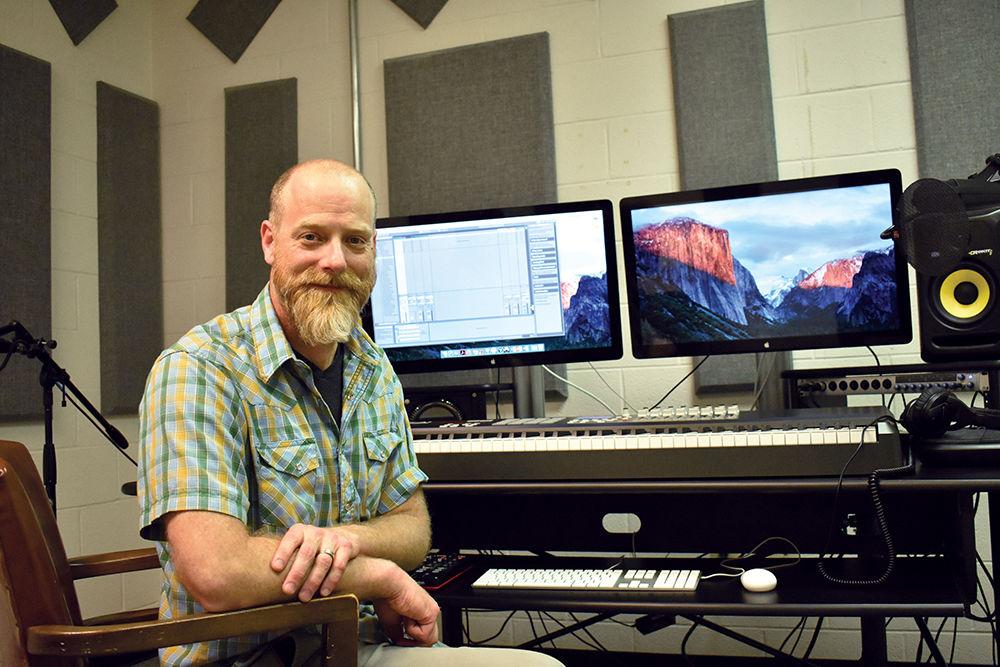Editing, mixing, sampling, compression, arrangement, auto tune and more. The game of making music has evolved drastically. It is now far more complicated than just strumming a guitar and banging a drum. Now there are hundreds of programs dedicated to music production — some free, some expensive, some for beginners and some only for industry veterans. Fortunately, NC State has provided students a good place to start on this complicated journey. It’s MUS 270: Songwriting using Digital Audio Workstations. (DAWs for short).
“There’s half a dozen pieces of software that all interact and it doesn’t always work right,” said Aaron Keane, a part-time instructor at NC State who teaches the course.
The course’s main focus is to teach students how to use three different music production programs: Ableton Live, Logic Pro and Pro Tools. But before students can jump into production, Keane likes to provide a brief history and ethics lesson to start out the semester.
“We cast a pretty broad net, especially when I do my ethics lessons,” Keane said, “I bring in visuals and different elements. I hopefully get the students thinking about other things outside the purview of this class.”
While only taking a few days to complete, these lessons provide an important foundation. The class looks at the history of the structure of songs, from opera all the way to pop music. After the history lessons, the course begins teaching the ethics of music, which, according to Keane, is an important topic in today’s music sampling and DJ culture.
Keane said he hopes that students who take the course can walk away with the knowledge of the basics of each program, and that every student should feel comfortable when they sit down at a computer to make music. Keane himself is a music industry veteran, having worked on various music projects in his life including scoring the Emmy-award-winning TV series, “Twice Born: Stories from the Special Delivery Unit.”
“I don’t have a doctorate,” Keane said. “I have 25 years in the industry doing work. I think I have a little bit of a fresh perspective. Not so much the ivory tower perspective, but maybe a little bit more gritty and real world.”
Each class is split into two sections, a lecture section and a workshopping section, where students can work directly with the professor on their projects to work out any problems they are having with different assignments. As part of the latter, the course meets once a week at one of D.H. Hill’s media production labs to work directly with the programs and the instructor.
“One of my favorite assignments in the class was actually a recent one in which we went out on campus to record different sounds for a sampling project we will be working with later on,” said Kamaria Fyffe, a student in this semester’s class and a senior studying English. “My project partner and I recorded various percussive sounds, some pig squealing in the Brickyard and a few other sounds unique to State’s community. It was fun to think of places on campus that would have interesting acoustics and to explore campus with a unique goal in mind. It helped me and my project partner to see how any sound can act as a building block for music and how those sounds are around us all the time.”
Fyffe said she has found that her class represents a wide range of fields, with students studying English, social sciences, engineering and music. Fyffe also said that she found the freedom of the class to be refreshing, with the course emphasizing developing skills and growing creatively over grades.
“I had never worked with the DAWs that we have worked with so far, but I’ve quickly learned that once you understand the basics, you can do many creative things with them,” Fyffe said.
Songwriting using DAWs currently counts as a visual and performing arts credit, as part of the additional breadth GEP requirement. While there is not currently a second-level DAWs course, the department wishes to create one in the future. The course is available in both fall and spring semester.













